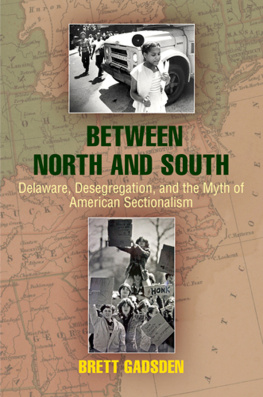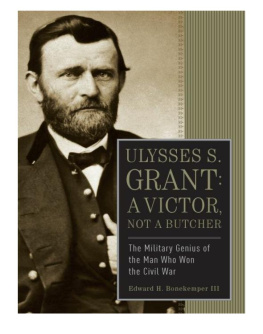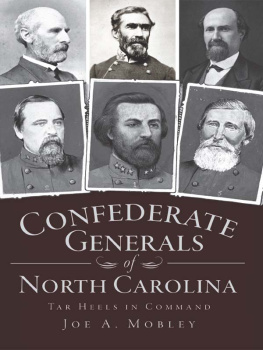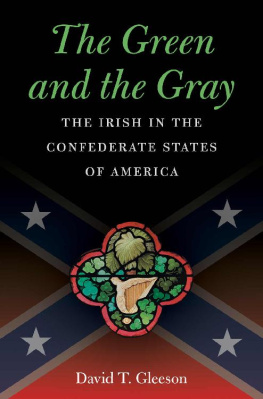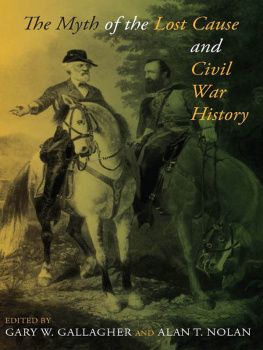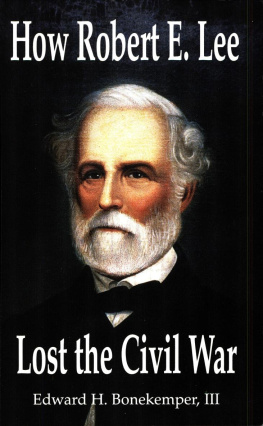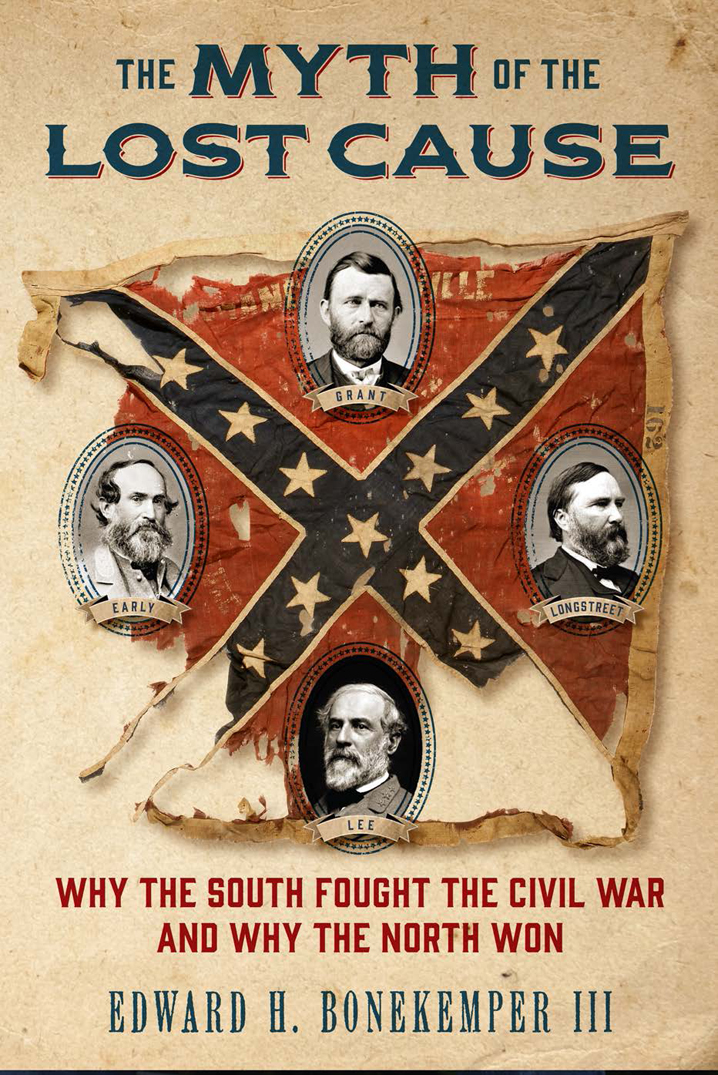
PRAISE FOR
THE MYTH OF THE LOST CAUSE
In The Myth of the Lost Cause, noted Civil War scholar and author Ed Bonekemper lays bare one of the most persistent and pernicious examples of revisionist history in the annals of America. The subject could hardly be more timely, as states rights advocates deny the root causes of the Civil War, dismiss the ignominious legacy of slavery, and seek to sugarcoat one of the most difficult and tragic interludes in our national history as the romantic last stand of a gallant, noble culture. Important reading for all Americans and for all who wish to understand the Civil War and how its significance was misrepresented in the ensuing century and a half.
DR. PEYTON R. HELM, president and professor of history, Muhlenberg College
This is not a book that believers in the Lost Cause will find comforting. It thoroughly, effectively, and convincingly demolishes the long-held mythologyas only Bonekemper can. It is must-reading for all Civil War scholars and buffsbut be prepared to have long-held beliefs put to the test.
JOHN F. MARSZALEK, professor emeritus of history and executive director, Ulysses S. Grant Presidential Library, Mississippi State University
Ed Bonekemper has written a thought-provoking, even controversial, look at how ex-Confederates came to frame the Civil Wars military history and how that history has shaped the reputations of Robert E. Lee and Ulysses S. Grant. This new work is well worth the read.
JEFFRY D. WERT, author of A Glorious Army and eight other Civil War books
It is remarkable that even 150 years after the Civil Wars guns fell silent so many still believe and are influenced by the ideas of the Lost Causethe most egregious of which is that slavery had absolutely nothing to do with the conflict. Bonekemper does an exemplary job of breaking down those myths and offering a better understanding of our nations most tragic moment, what the conflict was really about, and why ultimately the Confederate nation collapsed.
JONATHAN A. NOYALAS, author of Civil War Legacy in the Shenandoah: Remembrance, Reunion, and Reconciliation and ten other Civil War books
The myth of the Lost Cause continues to hold sway in many parts of American popular culture, from the belief that secession had little to do with slavery, to the contention that Ulysses S. Grant was a butcher. In this deeply researched book, Edward H. Bonekemper III draws on his wealth of knowledge about the Civil War and his skills as an attorney to provide a point-by-point refutation of the key tenets of the Lost Cause mythology.
JONATHAN W. WHITE, author of Emancipation, the Union Army and the Reelection of Abraham Lincoln
Winners do not always write the history books. For generations, legions of writers and historians perpetuated the myth of the Lost Cause, contending that the Civil War was not a struggle over slavery, but rather the hopeless effort of heroic leaders who defended local, home rule. In this vigorously argued book, Bonekemper refreshingly winnows fact from fiction, tackling the Lost Cause tenet by tenet. Clearly written and thoroughly documented, this welcome addition to the literature issues an indictment against the myth that is at once powerful, important, and timely.
BRIAN MATTHEW JORDAN, assistant professor of history, Sam Houston State University, and author of Marching Home: Union Veterans and Their Unending Civil War
THE MYTH OF THE LOST CAUSE

Copyright 2015 by Edward H. Bonekemper III
All rights reserved. No part of this publication may be reproduced or transmitted in any form or by any means electronic or mechanical, including photocopy, recording, or any information storage and retrieval system now known or to be invented, without permission in writing from the publisher, except by a reviewer who wishes to quote brief passages in connection with a review written for inclusion in a magazine, newspaper, website, or broadcast.
Regnery History is a trademark of Salem Communications Holding Corporation; Regnery is a registered trademark of Salem Communications Holding Corporation
First e-book edition 2015: 978-1-62157-473-6
Originally published in hardcover, 2015
Cataloging-in-Publication Data on file with the Library of Congress
Published in the United States by
Regnery History
An imprint of Regnery Publishing
A Division of Salem Media Group
300 New Jersey Ave NW
Washington, DC 20001
www.RegneryHistory.com
Manufactured in the United States of America
10 9 8 7 6 5 4 3 2 1
Books are available in quantity for promotional or premium use. For information on discounts and terms, please visit our website: www.Regnery.com.
Distributed to the trade by
Perseus Distribution
250 West 57th Street
New York, NY 10107
DEDICATION
This book is dedicated to Susan and her Dad.
CONTENTS
- CHAPTER ONE
THE MYTH OF THE LOST CAUSE - CHAPTER TWO
WHAT WAS THE NATURE OF SLAVERY IN 1861 AND WAS IT A DYING INSTITUTION? - CHAPTER THREE
WAS SLAVERY THE PRIMARY CAUSE OF SECESSION AND THE CIVIL WAR? - CHAPTER FOUR
COULD THE SOUTH HAVE WON THE CIVIL WAR? - CHAPTER FIVE
WAS ROBERT E. LEE ONE OF THE GREATEST GENERALS IN HISTORY? - CHAPTER SIX
DID JAMES LONGSTREET LOSE THE BATTLE OF GETTYSBURG AND THUS THE WAR? - CHAPTER SEVEN
DID ULYSSES S. GRANT WIN THE CIVIL WAR SIMPLY BY BRUTE FORCE AND SUPERIOR NUMBERS? - CHAPTER EIGHT
DID THE NORTH WIN BY WAGING TOTAL WAR? - CHAPTER NINE
CONCLUSION
Guide
T his is a book I have felt compelled to write for a number of years as I encountered too many people with mistaken impressions about the Civil War. Their viewpoints are an outgrowth of the Myth of the Lost Cause, which some Confederate leaders fostered to justify their causing and losing the Civil War. At the heart of the myth is the contention that the Civil War had nothing to do with slavery. It had everything to do with it.
Other facets of the Myth include the idealization of slavery, the adoration of Robert E. Lee and denigration of Ulysses S. Grant, the insistence that the South had no chance of winning the war, blaming James Longstreet (not Lee) for losing the Battle of Gettysburg, and condemning the North for waging total war.
This book is intended to examine and refute each of these components of the Myth of the Lost Cause.
W inners write the history of wars. So it is said. Confederate Major General Patrick Cleburne agreed: Surrender means that the history of this heroic struggle will be written by the enemy; that our youth will be trained by Northern school teachers; will learn from Northern school books their version of the War; will be impressed by all the influences of history and education to regard our gallant dead as traitors, and our maimed veterans as fit subjects for derision. It did not work out quite that way.
To the contrary, a coterie of disappointed Southerners, aided by many other conveniently forgetful and purposely misleading
As early as 1871, the former slave Frederick Douglass expressed his concern about the revival of secessionism in the South, describing the spirit of secession as a deeply rooted, devoutly cherished sentiment, inseparably identified with the lost cause, which the half measures of the Government towards the traitors has helped to cultivate and strengthen.
Next page

